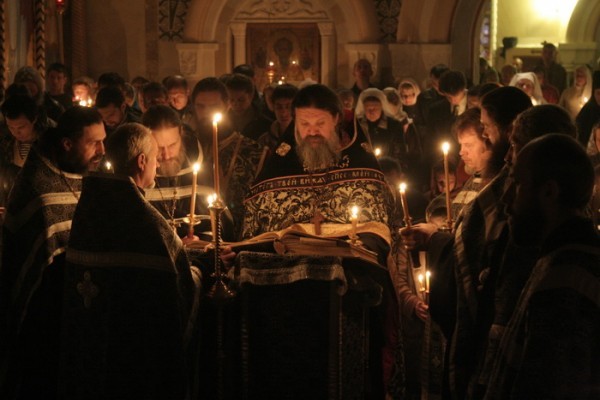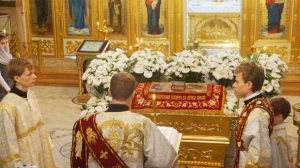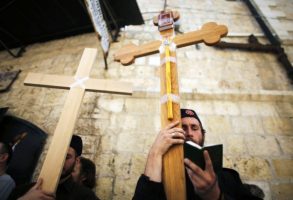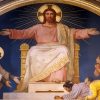Holy Week in a sense begins with the entry of Christ to Jerusalem. This entry full of glory, boisterous, noisy and which is all of it built on a misunderstanding. The people of Jerusalem meet Christ as a conqueror partly because they have heard that He has raised Lazarus from the dead and partly because they expect that now has come the time when He will become the Ruler of Israel, the God-given leader Who will free the country from the occupying forces, from the pagans that have conquered it and taken possession of a land which is God’s own land, have taken possession of Zion, the city of peace, dedicated to God and dedicated by God for His people. Christ knows that He is received as a glorious King because of this tragic misunderstanding and He knows also that the moment the people will have understood that He is not the Messiah they wish for, they turn against Him. And this is what we see in all the days to come: a crowd still under the spell of Christ but now fearful, hesitant, unable to protect Him except by its massive presence, but a crowd in which no-one will lift his voice to proclaim that the slander which is spread around against Him or later the condemnation which is spoken about Him is untrue. If one voice had been lifted in defence of Christ His condemnation could not have gone through without further judgement.
Some of you may remember the story of Daniel the prophet and Susanna: how she was condemned on false accusation and while she was taken to her doom the boy Daniel, a child of seven lifted up his voice and said: ‘I am free from the blood of this woman’. And all proceedings were suspended and she was found not guilty. Not one voice in this vast crowd that filled Jerusalem, that had come for the Passover from all the surrounding country and from countries far away not one voice was lifted because He had betrayed the expectation of the people and they no longer felt He was their leader, their Lord and their Guide.
In the first days Christ speaks. He speaks in the Temple in the presence of whoever wishes to hear Him: the priests are there and the Scribes, and the Pharisees, and the people, and His disciples, and His Mother and day after day He presents them with decisive final confrontations with their own conscience. I have taken down a few of the points because the readings are long and complex but they all centre round, each of them rather centres round one theme.
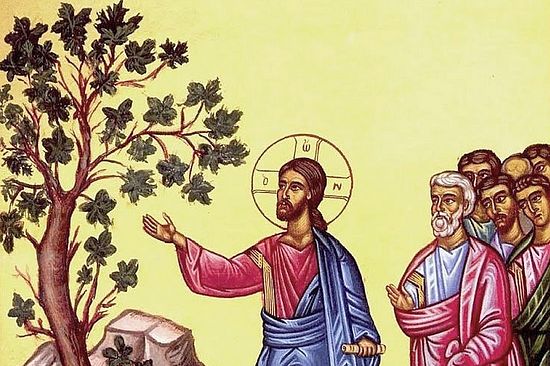
On the Monday the story of the fig tree, of the two sons who were both asked by their father to go and do his will of whom one said: ‘Yes, father’, and went not, and the other one said: ‘No’ and then repented. Here we are confronted with a first accusation of Christ against us and against those who surrounded Him in those days. Like the fig tree we are covered with leaves, like the fig tree we bear no fruit. We wear a mask, we pretend, we live a lie. Like the son full of good will we say: ‘Yes’ to all the commandments of God, we respond to all the promptings of our conscience, we are ready to do everything until the moment of doing comes and then we don’t do it. And it is the one that said: ‘No’, that thinks better and acts, again a lie, a person who is what he is not.
And then turning to Himself Christ proclaims the parable of the workers of the vineyard who murdered the son and the Gospel ends with a warning that the Lord is going to His death. It is because we lead a life which is a lie that murder, death must come upon the Son of God.
On Tuesday – apocalyptic visions: a warning that false prophets will come who will claim to be Christ. Again the same theme of the lie that kills and that those who will be faithful to Him will be persecuted, — those who will have chosen to be true and real against all the lie and beguilement of the world. And at the end of this apocalyptic vision Christ gives us, reminds us of the two commandments: love of God and love of the neighbour. And in the context of the persecution, perhaps, this commandment of love comes with particular force because on the one hand the commandment of love on the lips of Christ and indeed in the life and example of Christ means that we must love with all our life, but also if necessary with all our death, because greater love no-one has except him who lays down his life for his neighbour.
But why persecution? Because those who are of Christ, those who are of the Kingdom, those who have accepted the command of love and of reality will have to make a choice.
On Wednesday we are confronted with a series of questions which the Sadducees, the Pharisees, others ask of Christ. They are all aimed at forcing Him to give an answer that may later be used to doom Him.
… and their question is untrue. They know that the way in which they put it is destined to entrap Christ and lead Him to die. Hypocrisy is the sign here. And I what to bring forth, bring to your attention the first question which is asked because it applies to us very directly. He is asked whether He was prepared to pay the tax which every Jew was to pay to Caesar. And He asks for a coin, shows it to those who try to ensnare Him: ‘Whose image, whose inscription is on this coin?’ And looking at it they see the profile of the reigning Emperor and his name. And Christ says: ‘Render onto Caesar what is Caesar’s and unto God what is God’s’. Now, in the course of centuries these words have been underlined in many ways but what the direct and immediate meaning of these words is this: ‘Everything which bears the imprint of Caesar is his, everything that bears the imprint of the world belongs to the world. But what is the imprint and the name which is written on each of you?’ We are created in the image of God, we are like an icon. As a coin was marked by the profile of the Emperor in power so is each of us in the image of the living God. And when we ask ourselves what do we owe to Caesar and to God, the answer is that everything which is ours can be claimed from us, but we belong to no-one but God. And this is the point at which as we can see from the Book of Revelation that irremediable, inevitable and murderous encounter occurs between anti-Christ and those who are Christ’s own people, God’s own people, prepared to let go of everything because nothing is theirs and refusing to allow themselves to be owned by anyone but the living God Whose image they are, Whose imprint is on their face and Whose name is written in their hearts and indeed is part of their appellation: Are we not called Christ’s own people when we say that we are Christians?
And so again against this background of lie that will lead to the murder of the Son of God all the conflict between false prophecy and false ideals with the real choice and the persecution that ensues, against the background of this hypocrisy which brings out the fact that we belong to none but God on Thursday morning we hear a call: ‘Be ready’, – in the succession of readings from St. Mathew’s 24 and 25 chapter concerning the Judgement. You know these passages, I will only bring out what they speak about. This generation is like the generation in the time of Noah, they live forgetful of all responsibility, forgetful of judgement, carried away by their emotions and their passions, their greed and their fears, careless and irresponsible. The second parable is that of the servant who was left in charge of the household when his master went. The master will tarry, he is now the master, his is answerable to no-one, he can live according to the devices of his own heart, he begins to be a tyrant to others and to indulge in all his whims. ‘Beware, – says Christ, – the master will return at the hour which the servant does not expect him and then he will have to answer’.
And then the parable of the wise and the foolish virgins, those that were found not ready, those who allowed themselves to slumber. How many people spent all their times in a condition of slumber, asleep, inebriated, living in a world of dream, while the world of reality is coming dreadfully close and will first into their dream but when it will be too late for them to awake.
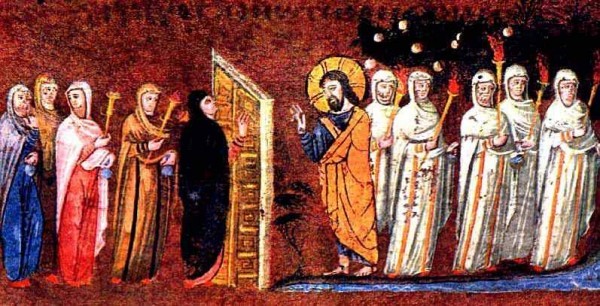
And then the parable of the talents: the man who was afraid of risking anything in the fear of the loosing everything and who when the Lord came had nothing to account for his life.
And lastly the parable of the sheep and the goats with this sharp question which is being asked from all of them: ‘Have you been human in the course of your human life? If you have not been human, compassionate, daringly compassionate at times there is no way for you into the world divine’. These are the readings.
Thursday is also the day of the Last Supper. The Last Supper is rooted in the story of Exodus. The Last Supper which the Jews ate on the soil of Egypt, in the land of their enslavement before they set out to reach the promised land through forty years of trial that was to make of men and women who had got accustomed to be slaves, to make them into free men and women capable of receiving a new law, and guided by this law eventually to come to the point when no law is necessary but grace and love. Now we stand in the threshold of a similar event; only that in Exodus the enslavement was of men and women under the rule temporary and worldly of the Pharaohs, while what Christ has come to effect is to free us from the power of Satan, of the adversary, of him who is the liar par excellence, the ‘diabolos’, the one who tries to beguile us into a world of fantasy, of hopes that will never materialise, of betrayal, of what is true and whole and real and who according to the word of Christ is the one who was the murderer from the beginning. Christ has come to free us from all power of enslavement, to put us face to face with Him with all the dignity of those called to be the sons and daughters of the Most High. This Last Supper is the supper of Exodus, with however a feature that strikes me always when I read this passage that no lamb is spoken of at the Last Supper although the lamb was at the very centre of the paschal supper, of the supper of the Passover in Exodus. And what strikes me is that there is no point at this particular Supper that the lamb should be the centre of it because it is the Lamb of God, the Servant of God, the suffering Servant, the Lamb of God slain before all ages Who is now the central figure of this meal. He blesses the bread, He blesses the cup. At that moment they are only symbols and will acquire the plenitude of their meaning when the Lamb will be slain, Christ crucified, death by death undone and the Risen Christ will become the Lord of all things endowed with all power by His Father. How many things there are: the long conversation of Christ that moves in a meandering way and it is so easy to understand how it moves if we remember that it is the last conversation Christ has with His disciples knowing that within a few hours His ministry will have come to an end and within a couple of days His life will have been taken from Him; rather, no, He Himself says: ‘No-one is taking My life from Me. I give it freely’. And yet He will have to die. And so He speaks of one thing or another and there are long silences probably, and He goes back to things said and He is being asked questions which He answers, and again there is silence, brooding full of foreboding.
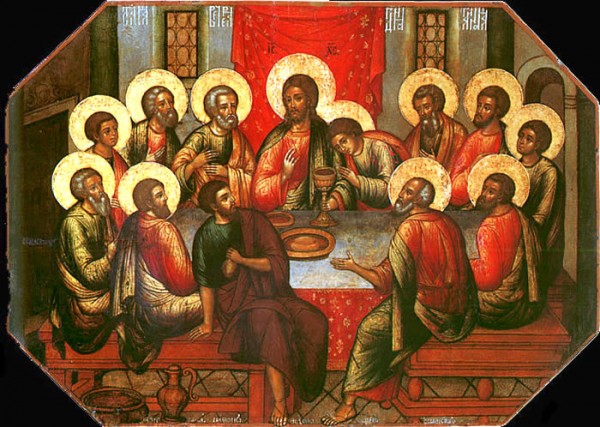
At this meal Judas for the last time is among his companions. He will leave the meal and betray Christ. Judas is one of the most mysterious persons of history because the reasons which seem to come to the fore in the Gospel cannot account really for his betrayal. In one of the Orthodox prayers of Thursday evening at the service which we call the service of the Twelve Lessons of the Passion of Christ it says: ‘Thou has sold thy Master as though He was a runaway slave.’ And indeed, thirty pieces of silver were nothing in regard to what the enemies of Christ would have paid for His head. So I don’t think we can begin to guess at the workings of his soul, we know only that he betrayed Christ. But know some more things: when Christ met him again in the Garden on the Mount of Olives He came towards him and called him ‘friend’. Someone has written in our century after millions of betrayals that no-one can be considered a spiritually perfectly mature who has not come to terms with betrayal, who can loose his equanimity at being betrayed and who can no longer call ‘friend’ him who has delivered him to his tormentors. Christ in His perfect maturity meets Judas and calls him friend without bitterness, without hatred but with a pain so deep probably, deeper than we can imagine.
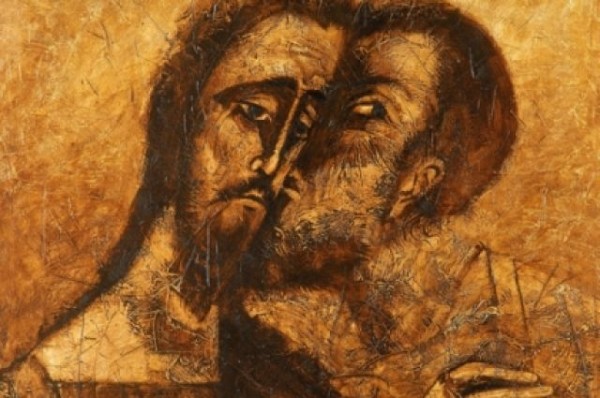
And another thing concerning Judas: he is abandoned by all, he is rejected by those who have paid for the innocent blood the thirty pieces of silver which were prophesied of old in the Old Testament; he does not dare come near the other Apostles because he does not know that Peter, John and James went to sleep when their Master was in agony, that John was allowed into the house of Caiaphas because he was a friend of the house into which Jesus was being taken to be battered, insulted, humiliated, slandered and condemned on lying evidence, that Peter betrayed Him also by renouncing Him three times, that all the disciples fled and left Him alone. All that Judas did not know and so he did not go back to his companions to express his misery and his repentance and his horror for himself. He had nowhere to go. Had all that happened after Pentecost or simply after the Resurrection of Christ wouldn’t the disciples have sort him out and saved him?
I have already mentioned Peter, John, James, the other apostles: loneliness, betrayal, rejection. Christ stood before God and before His death in the Garden of Gethsemane and He prayed three times and each of His prayers was a step towards a more total acceptance of the will of God, a more complete renunciation of His own will to live, His own horror of death: ‘Father, let this cup pass Me by… Father, if this cup can not pass Me by, let it come… Father, Thy will be done’… Step after step He conquered and He was ready to be taken because He had already given Himself.
And then the judgement: Caiaphas, Pilate, the exchange of Jesus for Barabbas, the mockery and the beating in the praetorian and then they are sent, the Via Dolorosa, the painful road from the praetorian with His cross on His shoulder towards the place without the walls where He would die. There was no place within the walls of the human city for the One Who was rejected by the city.
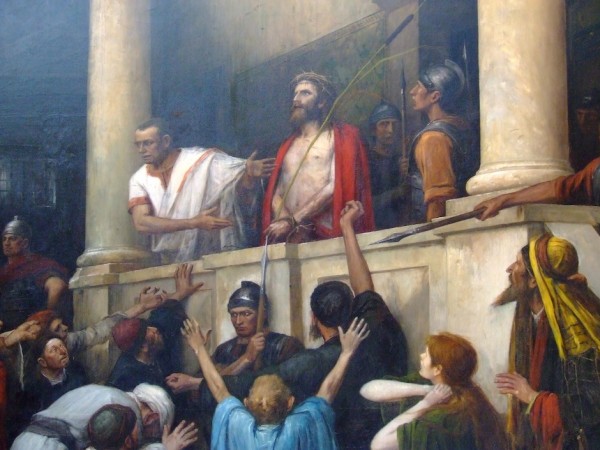
But what was to happen was even more frightening because having chosen to be God’s own and being rejected by men in their Godlessness, in their rebellion, in their alienation from God He had also chosen to remain faithful and solid with all men. And He found Himself like them alone, without God: ‘ My God, My God, why has Thou forsaken Me?’ And yet, when He was crucified His prayer was for those for whose sake He was loosing the earth and Heaven: ‘Forgive them Father, they do not know what they are doing’.
And He died. He died for us, He died because of us. As Christ said to a priest in a vision which is recorded in the life of one of the ancient saints: ‘Condemn no-one: if there had been one sinner of earth I would have died for him alone as I died for the whole of mankind’.
When we think of Calvary we must think of the Lord Jesus Christ hanging on the Cross, dying His human death, having already surrendered His life and therefore pronouncing a few words, but not one word in defence of Himself and wrapped in the same sacrificial silence, in the silence of the offering the Mother of God Who had brought Him some thirty three years ago to the Temple to be a blood offering to God according to the commandment of Exodus, the ransom for the blood of the children of Egypt spilled for the deliverance of the Israelites and now to deliver them and mankind together with them from the yoke of Satan, of the adversary, the Son of God was being accepted as a living sacrifice, as a blood offering. John, who knew how to love and therefore to participate, to be at one, and around them a crowd: the executioners who had done their work and felt they had no responsibility, who were sharing out His garments and those of the two men crucified to the right and to the left. And those who had brought about His murder, who laughed and mocked at Him: ‘If You art Christ come down from the Cross’.
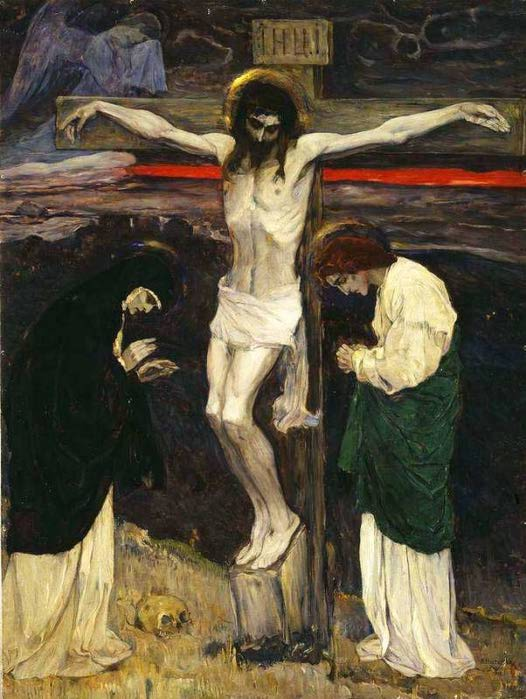
And the people around of whom some hoped He would come down from the Cross and then they could follow Him not in an act of faith but with the certainty that they would be protected by their Leader not in order to become lambs among the wolfs, to be sent as the Father sent Him but to be conquerors, the people of the victorious King. And those who hoped in their hearts that He would not come down from the Cross and then they would be, they would have an alibi to reject all that had wounded their hearts, stirred their conscience, forced them to see life in a new light. They could then reject the terrifying commandment of love and become again small, selfish and free, free from God, slaves to the world, to their passions, but free from the terror of greatness.
And then the two men on the right and the left side. The one saw the Innocent and the Just condemned by an iniquitous human judgement and therefore he accepted his own doom because if the righteous can die all the more the culprit. The other one saw the Innocent condemned, and he thought that therefore the iniquitous judges have no right to condemn him either and he rebelled and cursed and found no peace.
And then Christ died and He was taken down from the Cross and laid in the tomb, His body separated from His human soul while He still was filled with the divine Presence incorruptible, while His soul descended into the abode of death, into the sheol, the place of darkness and of absence, of alienation, of ultimate rejection. And as one of the Orthodox prayers says: ‘Hell opened wide its mouth to engulf its Enemy. It expected to seize a corpse and he was filled with the presence of God Himself”. That is the harrowing of hell, the Descent into hell of which the Apostle’s creed speaks and the victory of God over the devil, over death, a separatedness from God, over evil is already won but we on earth must wait for another day and this is why on Saturday in Holy Week in the Orthodox Church already foretold (?) by the singing of the Resurrection on the previous evening, the liturgy is one of the Resurrection: in bright vestments, in glorious song, with number of prophesies of the victory of God read. And then the victory which was won for us already reaches us in the night when we will sing that Christ is risen from the dead having undone death by death and to those in the tomb having given life. And this life now pours out and reaches us. For the apostles Good Friday was the last day of the week unrelieved (?) darkness, the final defeat of Christ, the victory of evil, the end of life. For us it cannot be this. However we try in imagination to live by the moment we still can see that these events lead to the victory.
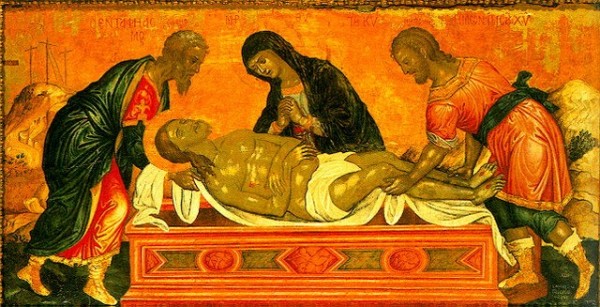
But what has happened to Christ and for mankind has not yet happened in our lives if we have not learned so to identify with Christ as to make His earthly destiny into our destiny, if possessed of the life of God through grace we do not, like Christ, enter into the darkness of the world to be His messengers, to be the light that shines in darkness, the voice that speaks in the desert, the love of God, the divine compassion among men. And so from all the people involved in these days, from every event, from every person and every situation we must learn to become partakers of the life of Christ and when we receive communion to accept both: to partake in His eternal victory and to be His witnesses if necessary in small things and in things great, to be His witnesses if necessary in life and if need be in death.
Well, here are too many and too few thoughts that are far too superficial for what they touch. But going into these last days of Holy Week, into this Good Friday, into this Saturday where we wait in harsh silence for the proclamation of the victory, identify with whomever you can: the Mother of God, His apostles, His disciples, with whomever you can but go all the way with Him side by side with one of those who has gone that way and has found salvation.












